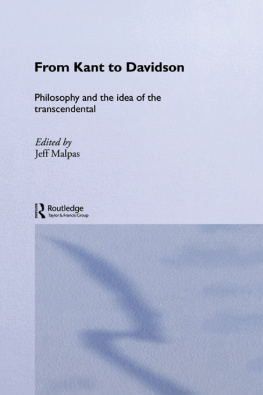Kant Immanuel - Metaphysical Elements of Ethics
Here you can read online Kant Immanuel - Metaphysical Elements of Ethics full text of the book (entire story) in english for free. Download pdf and epub, get meaning, cover and reviews about this ebook. genre: Science. Description of the work, (preface) as well as reviews are available. Best literature library LitArk.com created for fans of good reading and offers a wide selection of genres:
Romance novel
Science fiction
Adventure
Detective
Science
History
Home and family
Prose
Art
Politics
Computer
Non-fiction
Religion
Business
Children
Humor
Choose a favorite category and find really read worthwhile books. Enjoy immersion in the world of imagination, feel the emotions of the characters or learn something new for yourself, make an fascinating discovery.
- Book:Metaphysical Elements of Ethics
- Author:
- Genre:
- Rating:4 / 5
- Favourites:Add to favourites
- Your mark:
- 80
- 1
- 2
- 3
- 4
- 5
Metaphysical Elements of Ethics: summary, description and annotation
We offer to read an annotation, description, summary or preface (depends on what the author of the book "Metaphysical Elements of Ethics" wrote himself). If you haven't found the necessary information about the book — write in the comments, we will try to find it.
Metaphysical Elements of Ethics — read online for free the complete book (whole text) full work
Below is the text of the book, divided by pages. System saving the place of the last page read, allows you to conveniently read the book "Metaphysical Elements of Ethics" online for free, without having to search again every time where you left off. Put a bookmark, and you can go to the page where you finished reading at any time.
Font size:
Interval:
Bookmark:
The Project Gutenberg EBook of The Metaphysical Elements of Ethicsby Immanuel Kant(#4 in our series by Immanuel Kant)
Copyright laws are changing all over the world. Be sure to check thecopyright laws for your country before downloading or redistributingthis or any other Project Gutenberg eBook.
This header should be the first thing seen when viewing this ProjectGutenberg file. Please do not remove it. Do not change or edit theheader without written permission.
Please read the "legal small print," and other information about theeBook and Project Gutenberg at the bottom of this file. Included isimportant information about your specific rights and restrictions inhow the file may be used. You can also find out about how to make adonation to Project Gutenberg, and how to get involved.
**Welcome To The World of Free Plain Vanilla Electronic Texts**
**eBooks Readable By Both Humans and By Computers, Since 1971**
*****These eBooks Were Prepared By Thousands of Volunteers!*****
Title: The Metaphysical Elements of Ethics
Author: Immanuel Kant
Release Date: May, 2004 [EBook #5684][Yes, we are more than one year ahead of schedule][This file was first posted on August 7, 2002]
Edition: 10
Language: English
*** START OF THE PROJECT GUTENBERG EBOOK, THE METAPHYSICAL ELEMENTS OF ETHICS ***
This eBook was prepared by Matthew Stapleton.
1780
by Immanuel Kant
translated by Thomas Kingsmill Abbott
If there exists on any subject a philosophy (that is, a system ofrational knowledge based on concepts), then there must also be forthis philosophy a system of pure rational concepts, independent of anycondition of intuition, in other words, a metaphysic. It may beasked whether metaphysical elements are required also for everypractical philosophy, which is the doctrine of duties, and thereforealso for Ethics, in order to be able to present it as a true science(systematically), not merely as an aggregate of separate doctrines(fragmentarily). As regards pure jurisprudence, no one will questionthis requirement; for it concerns only what is formal in theelective will, which has to be limited in its external relationsaccording to laws of freedom; without regarding any end which is thematter of this will. Here, therefore, deontology is a merescientific doctrine (doctrina scientiae). *
* One who is acquainted with practical philosophy is not,therefore, a practical philosopher. The latter is he who makes therational end the principle of his actions, while at the same time hejoins with this the necessary knowledge which, as it aims at action,must not be spun out into the most subtile threads of metaphysic,unless a legal duty is in question; in which case meum and tuum mustbe accurately determined in the balance of justice, on the principleof equality of action and action, which requires something likemathematical proportion, but not in the case of a mere ethical duty.For in this case the question is not only to know what it is a duty todo (a thing which on account of the ends that all men naturally havecan be easily decided), but the chief point is the inner principleof the will namely that the consciousness of this duty be also thespring of action, in order that we may be able to say of the man whojoins to his knowledge this principle of wisdom that he is a practicalphilosopher.
Now in this philosophy (of ethics) it seems contrary to the ideaof it that we should go back to metaphysical elements in order to makethe notion of duty purified from everything empirical (from everyfeeling) a motive of action. For what sort of notion can we form ofthe mighty power and herculean strength which would be sufficient toovercome the vice-breeding inclinations, if Virtue is to borrow her"arms from the armoury of metaphysics," which is a matter ofspeculation that only few men can handle? Hence all ethical teachingin lecture rooms, pulpits, and popular books, when it is decked outwith fragments of metaphysics, becomes ridiculous. But it is not,therefore, useless, much less ridiculous, to trace in metaphysicsthe first principles of ethics; for it is only as a philosopher thatanyone can reach the first principles of this conception of duty,otherwise we could not look for either certainty or purity in theethical teaching. To rely for this reason on a certain feelingwhich, on account of the effect expected from it, is called moral,may, perhaps, even satisfy the popular teacher, provided he desires asthe criterion of a moral duty to consider the problem: "If everyone inevery case made your maxim the universal law, how could this law beconsistent with itself?" But if it were merely feeling that made itour duty to take this principle as a criterion, then this would not bedictated by reason, but only adopted instinctively and thereforeblindly.
{PREFACE ^paragraph 5}
But in fact, whatever men imagine, no moral principle is based onany feeling, but such a principle is really nothing else than anobscurely conceived metaphysic which inheres in every man'sreasoning faculty; as the teacher will easily find who tries tocatechize his pupils in the Socratic method about the imperative ofduty and its application to the moral judgement of his actions. Themode of stating it need not be always metaphysical, and the languageneed not necessarily be scholastic, unless the pupil is to betrained to be a philosopher. But the thought must go back to theelements of metaphysics, without which we cannot expect anycertainty or purity, or even motive power in ethics.
If we deviate from this principle and begin from pathological, orpurely sensitive, or even moral feeling (from what is subjectivelypractical instead of what is objective), that is, from the matter ofthe will, the end, not from its form that is the law, in order fromthence to determine duties; then, certainly, there are no metaphysicalelements of ethics, for feeling by whatever it may be excited isalways physical. But then ethical teaching, whether in schools, orlecture-rooms, etc., is corrupted in its source. For it is not amatter of indifference by what motives or means one is led to a goodpurpose (the obedience to duty). However disgusting, then, metaphysicsmay appear to those pretended philosophers who dogmatize oracularly,or even brilliantly, about the doctrine of duty, it is,nevertheless, an indispensable duty for those who oppose it to go backto its principles even in ethics, and to begin by going to school onits benches.
We may fairly wonder how, after all previous explanations of theprinciples of duty, so far as it is derived from pure reason, it wasstill possible to reduce it again to a doctrine of happiness; insuch a way, however, that a certain moral happiness not resting onempirical causes was ultimately arrived at, a self-contradictorynonentity. In fact, when the thinking man has conquered thetemptations to vice, and is conscious of having done his (oftenhard) duty, he finds himself in a state of peace and satisfactionwhich may well be called happiness, in which virtue is her own reward.Now, says the eudaemonist, this delight, this happiness, is the realmotive of his acting virtuously. The notion of duty, says be, does notimmediately determine his will; it is only by means of the happinessin prospect that he is moved to his duty. Now, on the other hand,since he can promise himself this reward of virtue only from theconsciousness of having done his duty, it is clear that the lattermust have preceded: that is, be must feel himself bound to do his dutybefore he thinks, and without thinking, that happiness will be theconsequence of obedience to duty. He is thus involved in a circle inhis assignment of cause and effect. He can only hope to be happy if heis conscious of his obedience to duty: and he can only be moved toobedience to duty if be foresees that he will thereby become happy.But in this reasoning there is also a contradiction. For, on the oneside, he must obey his duty, without asking what effect this will haveon his happiness, consequently, from a moral principle; on the otherside, he can only recognize something as his duty when he can reckonon happiness which will accrue to him thereby, and consequently on apathological principle, which is the direct opposite of the former.
Next pageFont size:
Interval:
Bookmark:
Similar books «Metaphysical Elements of Ethics»
Look at similar books to Metaphysical Elements of Ethics. We have selected literature similar in name and meaning in the hope of providing readers with more options to find new, interesting, not yet read works.
Discussion, reviews of the book Metaphysical Elements of Ethics and just readers' own opinions. Leave your comments, write what you think about the work, its meaning or the main characters. Specify what exactly you liked and what you didn't like, and why you think so.













